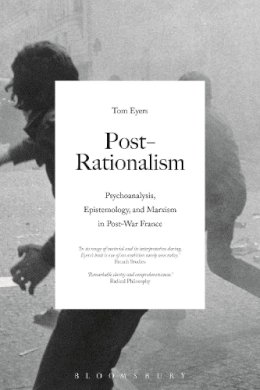17%OFF
Stock image for illustration purposes only - book cover, edition or condition may vary.
Post-Rationalism: Psychoanalysis, Epistemology, and Marxism in Post-War France
Dr Tom Eyers
FREE Delivery in Ireland
Description for Post-Rationalism: Psychoanalysis, Epistemology, and Marxism in Post-War France
Paperback. Num Pages: 232 pages. BIC Classification: 1DDF; 3JJPG; 3JJPK; HPCF7. Category: (P) Professional & Vocational. Dimension: 158 x 236 x 17. Weight in Grams: 386.
Post-Rationalism takes the experimental journal of psychoanalysis and philosophy, Cahiers pour l’Analyse, as its main source. Established by students of Louis Althusser in 1966, the journal has rarely figured in the literature, although it contained the first published work of authors now famous in contemporary critical thought, including Alain Badiou, Jean-Claude Milner, Luce Irigaray, André Green and Jacques-Alain Miller. The Cahiers served as a testing ground for the combination of diverse intellectual sources indicative of the period, including the influential reinvention of Freud and Marx undertaken by Lacan and Althusser, and the earlier post-rationalist philosophy of science pioneered by Gaston ... Read moreBachelard, Georges Canguilhem and Alexandre Koyré. This book is a wide-ranging analysis of the intellectual foundations of structuralism, re-connecting the work of young post-Lacanian and post-Althusserian theorists with their predecessors in French philosophy of science. Tom Eyers provides an important corrective to standard histories of the period, focussing on the ways in which French epistemological writing of the 1930s and 1940s - especially that of Bachelard and Canguilhem - laid the ground for the emergence of structuralism in the 1950s and 1960s, thus questioning the standard historical narrative that posits structuralism as emerging chiefly in reaction to phenomenology and existentialism. Show Less
Product Details
Publisher
Bloomsbury Publishing PLC
Place of Publication
London, United Kingdom
Shipping Time
Usually ships in 5 to 9 working days
About Dr Tom Eyers
Tom Eyers is Assistant Professor of Philosophy at Duquesne University. He is the author of Lacan and the Concept of the Real (2012).
Reviews for Post-Rationalism: Psychoanalysis, Epistemology, and Marxism in Post-War France
Eyers’s rubric of ‘post-rationalism’ clears the ground for a new, more nuanced conception of structuralist thought – a structuralism rigorously observant of the cross-currents between such ostensible oppositions as subject and structure, concept and object... Eyers has restored, with remarkable clarity and comprehensiveness, the crucial details of a bigger picture – one whose continuing reconstruction will further accentuate its political ... Read moreresonance, past and present.
Radical Philosophy
In its range of material and its interpretative daring, Eyers’s book is one of an ambition rarely seen today. As focus inevitably turns towards more contemporary trends, it will surely prove to be a singular resource and a potent rejoinder to those stressing the novelty of a ‘scientific turn’ in recent French thought.
Paul Earlie, Queen's College, Oxford
French Studies
In this exceptionally clear and well-argued book, Eyers shows us forgotten roots of French structuralism in the earlier rationalism of Bachelard, Canguilhem and Althusser. He thereby gives us new and important insights into the works of Lacan, Badiou and their circles.
James Williams, University of Dundee, UK This is an outstanding study of an exciting and much-neglected period in postwar French philosophy, and Eyers successfully puts to rest many false presuppositions about the nature of continental philosophy itself.
Ed Pluth, Professor, Department Chair of Philosophy, California State University, Chico, USA This is an illuminating reconstruction of an influential but long-neglected moment in contemporary philosophy. Tom Eyers draws on his expert knowledge of French psychoanalysis and philosophy to propose a valuable new characterisation of structuralist epistemology in general, and of essential works by and around Althusser and Lacan in particular.
Peter Hallward, Professor of Modern European Philosophy, Kingston University London, UK In its many readings and appropriations the incredibly productive current of French Post-War theory has been often watered down and its edges blunted beyond recognition. Tom Eyers’ book cuts straight to the core of the ground-breaking issues that animated it at the outset. With an admirable, almost surgical precision, Eyers is able to render us the surprisingly vivid elements that formed and informed that tradition. Far from a simple historical study, the result is an amazing work packed with stunning relevance for the most burning discussions that are taking place today in philosophy and critical theory.
Alenka Zupancic, Researcher, Institute of Philosophy of the Slovenian Academy of Sciences and Arts, and Visiting Professor at the European Graduate School The flash appearance of Cahiers pour l’Analyse, a journal published by a group of students at the École normale supérieure in 1966-69, inspired by Althusser, Lacan and the epistemological tradition of Canguilhem and Bachelard, marks one of the great starry moments of the twentieth century thought. Tom Eyers’ book brings it to life with verve, erudition and engagement, tracing both the genealogy of this explosive laboratory of concepts and its aftermath stretching to the most pressing issues of the present moment of theory. An indispensible book mapping out an indispensible trajectory.
Mladen Dolar, Professor, University of Ljubljana, Slovenia ... in its range of material and its interpretative daring, Eyers’s book is one of an ambition rarely seen today. As focus inevitably turns towards more contemporary trends, it will surely prove to be a singular resource and a potent rejoinder to those stressing the novelty of a ‘scientific turn’ in recent French thought.
Paul Earlie, The Queen's College, Oxford, UK
French Studies
Tom Eyers has written an important book and that Bloomsbury has seen fit to republish it in an affordable and elegant paperback edition is validation of its central intuition: that the conceptual tensions forged in 1960s France at the intersection of psychoanalysis, epistemology, and Marxism are no less pertinent to critical theoretical work in the humanities today than when they were first formulated. The book is a decisive intervention, and something of a promissory note…It also foretells the significance of Tom Eyers’s future contributions to this set of perennial concerns.
Knox Peden, Australian National University
H-France Review
Show Less


